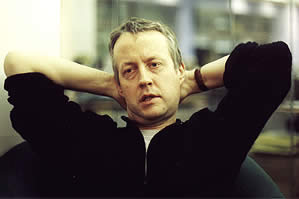| 
Looking at This Filthy Earth and My Brother Tom , why do you think we should continue to make that level of very uncommercial films in Britain?
I think what we should be developing and making more of are, from a distribution point of view, films stand out and be marketed effectively. Part of that is to do with the creative visions of the filmmakers and what I regard as low budget, commercially viable films aren’t actually the auteur, original ones but are what you’d call studio e-list; very low budget, very generic, minor cast, minor director. These have to compete on the same terms as the big budget studio movies. No disrespect but these are films that probably won’t do anything for anybody because they won’t get a theatrical release. Therefore, what they can sell on further down the line in terms of PayTV etc, is pretty minimal. If you look at it in purely cash terms, a gamble on a film that is genuinely original and that you can market to an audience, probably stands a better chance than something that tends to be very derivative - even if it seems more commercial on paper. It’s not easy and what is a problem is the cost of selling a film on the international market, an example being My Brother Tom . It was shot for $1.5m, everyone worked really hard on a very tight schedule but trying to sell that kind of film internationally is hugely expensive. An American film of similar subject matter would probably be made for $500,000, perhaps a little more. That’s the problem; trying to recoup that sort of money you have to make a lot of decent sales on the arthouse market. What we have to do now is develop stories that are very containable. What do you mean by containable?
Well, a fairly limited amount of locations, quite a small cast. The films are the ones that you feel have started off at £10m and have been reduced all the way. We also have to ask ourselves some pretty hard questions about whether the films are going to make any money. A lot of how to get people to see a film is about the market as well as the film. 
(Jump Tomorrow) Jump Tomorrow is a good example of a film that plays very well at screenings but which is very hard to persuade people to see it. Principles of Lust will be an interesting one because that’s being shot for quite a bit less than This Filthy Earth- I think about $850,000. But Penny Woolcock has kinda got an economy of speed, whilst shooting on film, that is pretty rare. For a film of that budget it’s actually got a good cast, and they were all came on board because they were attracted to the characters, which are very demanding. What’s more, The Principles of Lust is very marketable, much more so than This Filthy Earth - I should add that that was never an issue and that there was no discussion about it. 
(This Filthy Earth) What’s going on with Spirit Dance?
They have one project in development and it’s part of something in which we’ve aimed to give a number of directors a chance to make a film, with film. That’s being written at the moment. Has that anything with Tinge Krishman?
No, she is involved with them and Spirit Dance is home to that project. They have a couple of other things in the works. How, ideally, would you like to receive applications and what are the most common mistakes?
Ideally, people should attach to a letter some examples of their work and some semblance of their idea. The most common mistake is, "Dear Robin, I attach the first draft of my script." The reason that’s a mistake, even if it’s a short, is that you have to take a very close look at why they are doing the short, who’s going to manage the money etc. Nobody puts money into a project without a great deal of understanding and knowledge of who it is, for fairly obvious reasons. A lot of people feel, and it’s fair enough, that they don’t have enough experience and don’t want to draw attention to it, so they put nothing down. Of course you then know that you are dealing with someone with no experience. The key objective if you really are outside is just crossing the threshold with somebody, whether it be someone at the BBC or an agent. How do you source talent?
Sometimes through the shorts that fund anyway, from festivals we attend, from screenings we attend. Some we find through television and documentary as well. One more question, a simple one I think. How can we bring production budgets down?
A simple one?! (laughs) I can’t tell you how long I’ve been trying to crack that one. I don’t think we’ll bring budgets down hugely by fetishising digital technology. It can be part of the answer but we take a slightly different stance in that, in budgeting a film we include the cost of the blow-up. We gave Penny Woolcock the film on Super16 and I’m sure that, for the look she wants and the speed she’s working at, it’s a damn good format for her. My Brother Tom was shot on digital and was more expensive so there are a lot of other factors. How much stock you shoot - Penny is working with a much smaller team which helps lower the budget significantly. 
(My Brother Tom) I think fundamentally it’s about trying to find the depth and the cinematic and emotional scale akin to someone like Ridley Scott without using the big, expensive equipment. It is hard but that’s the essence of it and I think there’s a danger of jumping to digital because it will bring costs down - it may be a little cheaper but there are other factors. Yes, having directors who can work that bit faster and even actors who are prepared to muck in. Of course, budgets can always be brought down if people are prepared to be paid a little less but generally it’s about finding good stories that aren’t necessarily dependent on huge apparatus. An example would be Darren Aronofsky’s Pi. That would be an ideal film, in terms of size and depth and amazing new talent, for FilmFour Lab. It was also made very cheaply and admittedly, most of the people that worked on it were only going to be paid off the back end. But then 98% of those low budget films are not going to find distribution so, now, there are 100’s if not 1000’s of filmmakers saying to themselves, "my film hasn’t got into Sundance, what am I going to do now?" |